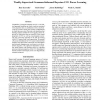Free Online Productivity Tools
i2Speak
i2Symbol
i2OCR
iTex2Img
iWeb2Print
iWeb2Shot
i2Type
iPdf2Split
iPdf2Merge
i2Bopomofo
i2Arabic
i2Style
i2Image
i2PDF
iLatex2Rtf
Sci2ools
AAAI
2015
2015
Weakly-Supervised Grammar-Informed Bayesian CCG Parser Learning
Combinatory Categorial Grammar (CCG) is a lexicalized grammar formalism in which words are associated with categories that, in combination with a small universal set of rules, specify the syntactic configurations in which they may occur. Previous work has shown that learning sequence models for CCG tagging can be improved by using priors that are sensitive to the formal properties of CCG as well as cross-linguistic universals. We extend this approach to the task of learning a full CCG parser from weak supervision. We present a Bayesian formulation for CCG parser induction that assumes only supervision in the form of an incomplete tag dictionary mapping some word types to sets of potential categories. Our approach outperforms a baseline model trained with uniform priors by exploiting universal, intrinsic properties of the CCG formalism to bias the model toward simpler, more cross-linguistically common categories.
| Added | 27 Mar 2016 |
| Updated | 27 Mar 2016 |
| Type | Journal |
| Year | 2015 |
| Where | AAAI |
| Authors | Dan Garrette, Chris Dyer, Jason Baldridge, Noah A. Smith |
Comments (0)

